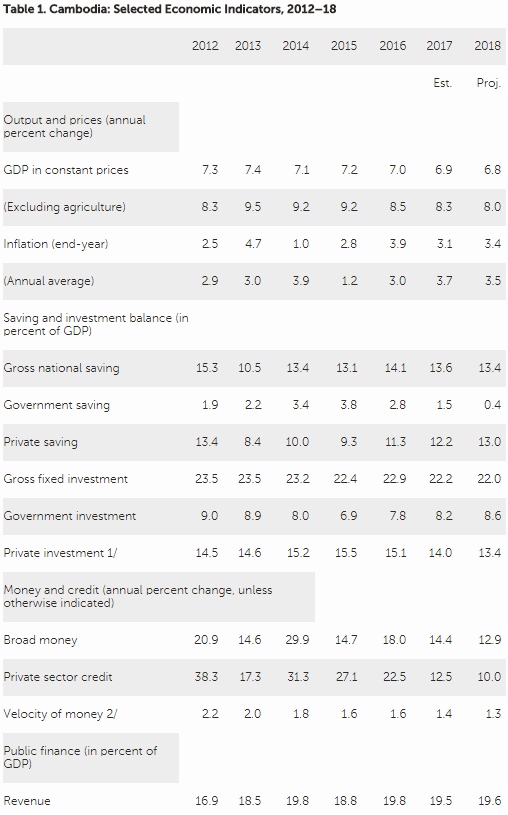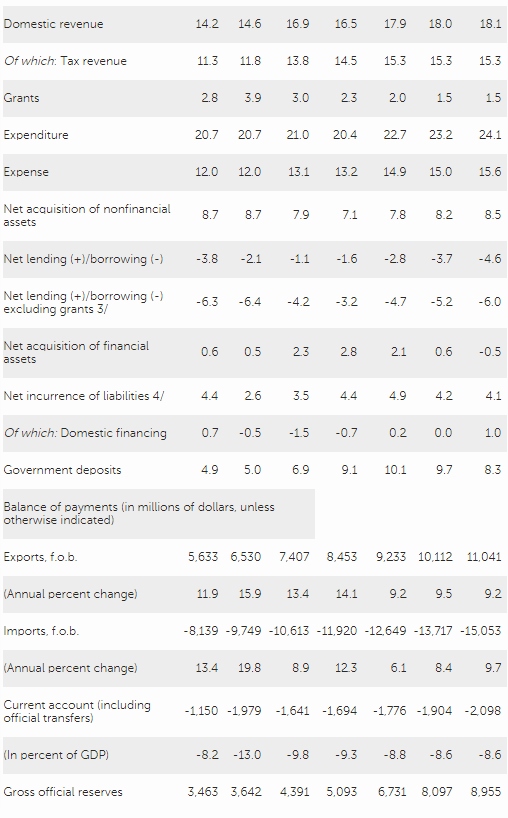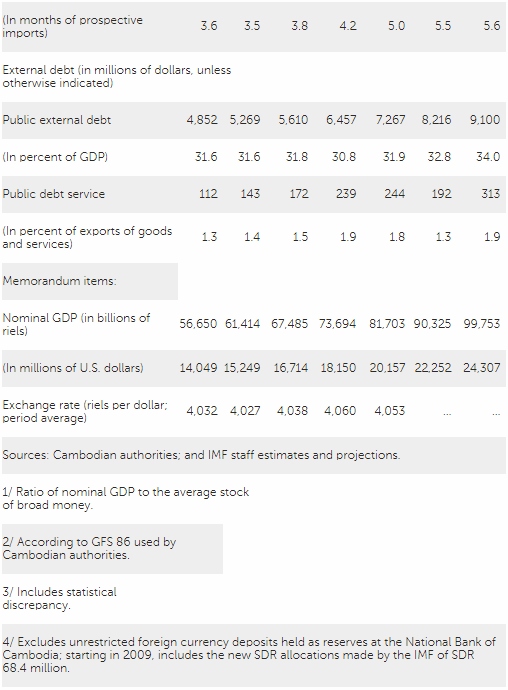IMF Executive Board Concludes Article IV Consultation with Cambodia
On September 22, 2017, the Executive Board of the International Monetary Fund (IMF) concluded the Article IV consultation with Cambodia.
Cambodia’s economy is expected to grow by 6.9 percent this year, with moderating private investment offset by higher public spending and robust construction and tourism activities. Headline inflation rose to 3 percent in 2016 and 3.5 in the first half of 2017, mainly driven by higher food and energy prices.
Overall credit growth has slowed, owing in part to policy measures. Real estate sector-related bank credit growth, however, remains strong, supported by demand for housing from Cambodia’s young and growing middle-income population.
The current account deficit narrowed to 8.8 percent of GDP in 2016. Driven by strong FDI inflows, foreign reserves have continued to grow, reaching $7.9 billion in June 2017, about 5.5 months of next year’s imports.
While the authorities again outperformed their revenue target in 2016, higher current spending resulted in an increase of the fiscal deficit to around 2.8 percent of GDP (compared with 1.6 percent in 2015). The fiscal deficit is expected to widen further this year due to higher public sector wages and other election-related current spending.
Looking ahead, the outlook is positive, although challenges remain. Real GDP growth is projected to remain robust over the next few years. Growth is then expected to slow over the medium-term to around 6 percent, due to moderation in the credit and real-estate cycles and ongoing challenges in improving economic diversification and competitiveness.
Executive Board Assessment
Executive Directors commended the authorities for Cambodia’s impressive economic growth over the past few years, which has benefited from a stable macroeconomic environment and efficiency improvements. Directors were encouraged by the dramatic gains in poverty reduction over the past two decades. They considered that, with a robust external environment and strong domestic fundamentals supporting investment, Cambodia’s economic outlook is positive. Directors noted, however, that the outlook is subject to downside risks stemming from elevated financial sector vulnerabilities, as well as the external outlook, including weaker-than-expected growth in Cambodia’s main trading partners. Against this background, Directors encouraged the authorities to strengthen the fiscal position, safeguard financial sector stability, and implement reforms to boost competitiveness and the business climate.
Directors welcomed policy measures to bolster financial stability, which have helped moderate credit growth, and ongoing efforts to address vulnerabilities. They considered that further targeted prudential policies will be key to containing macro-financial risks. Priorities include strengthening regulations on loan classification to better manage credit risk; introduction of additional targeted macro-prudential policies, including gradually increasing reserve requirements on foreign exchange liabilities to build liquidity buffers; and expediting collection of data on the real-estate sector. Directors considered that the growing systemic relevance of large deposit-taking micro-finance institutions warrants strengthening prudential regulation, and saw merit in the development of a comprehensive crisis management framework. Implementation of the remaining FSAP recommendations was also encouraged.
Directors welcomed efforts to promote financial market development and steps that have been taken to improve financial inclusion. However, they noted that Cambodia’s high level of dollarization contributes to vulnerabilities and limits the scope for monetary policy. Directors underlined the importance of expanding use of the local currency and developing the equity, interbank, government and corporate bond, and foreign exchange markets. Further efforts to promote inclusion should focus on improving financial literacy and consumer protection and introducing a comprehensive financial inclusion strategy, which would help address risks, while at the same time fostering innovation and competition.
Directors commended the improvements in tax administration, which have led to large revenue increases and the accumulation of government deposits, as well as the planned framework for social protection. To ensure that the recent gains are sustained, further improvements in revenue administration and tax policy modernization are needed. Directors emphasized that fiscal deficits should be contained to safeguard fiscal and external sustainability. Further public wage increases should be fiscally sustainable and be accompanied by continued progress in public administration reforms, while spending on education and health should be safeguarded. Directors underscored that developing a medium-term budget framework would improve spending efficiency, while strengthening the framework for public-private partnership would better manage fiscal costs and risks.
Directors encouraged the authorities to accelerate the implementation of structural reforms to promote economic diversification, boost competitiveness, and improve the business climate and inclusiveness. They recommended that efforts should continue to focus on lowering energy costs, accelerating implementation of the Industrial Development Policy, upgrading infrastructure, strengthening the rule of law and transparency, and further investing in human capital. Including the impact of climate change and mitigating measures in policy design would improve resilience.



Source: International Monetary Fund
- 282 reads
Human Rights
Fostering a More Humane World: The 28th Eurasian Economic Summi

Conscience, Hope, and Action: Keys to Global Peace and Sustainability

Ringing FOWPAL’s Peace Bell for the World:Nobel Peace Prize Laureates’ Visions and Actions

Protecting the World’s Cultural Diversity for a Sustainable Future

Puppet Show I International Friendship Day 2020

